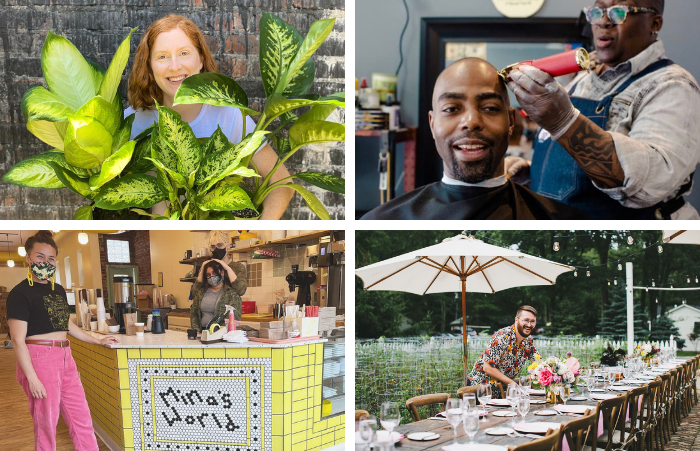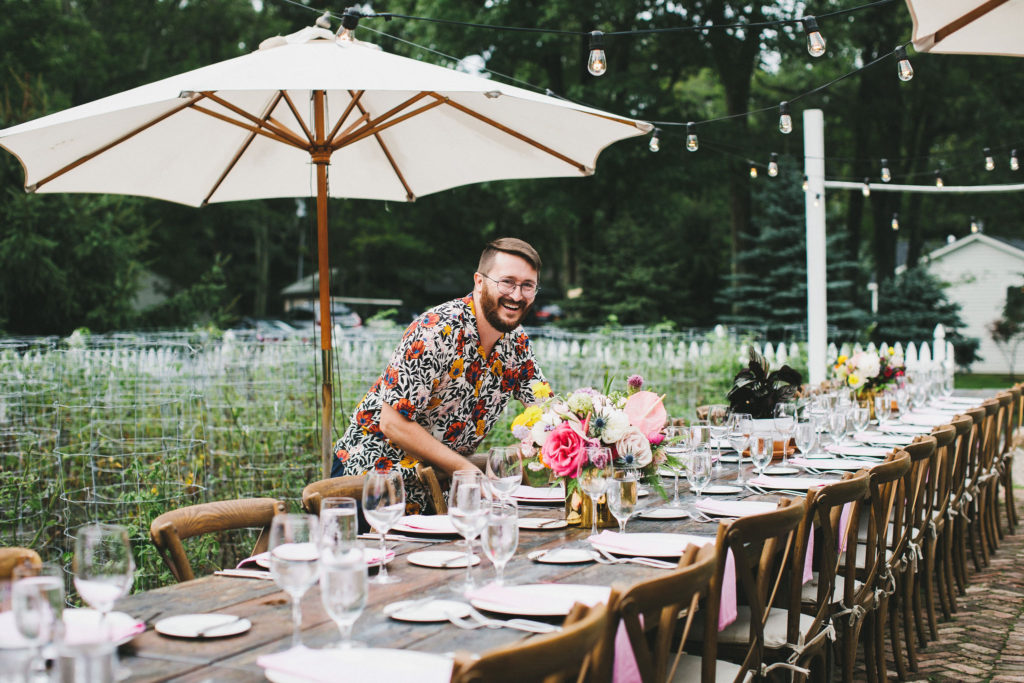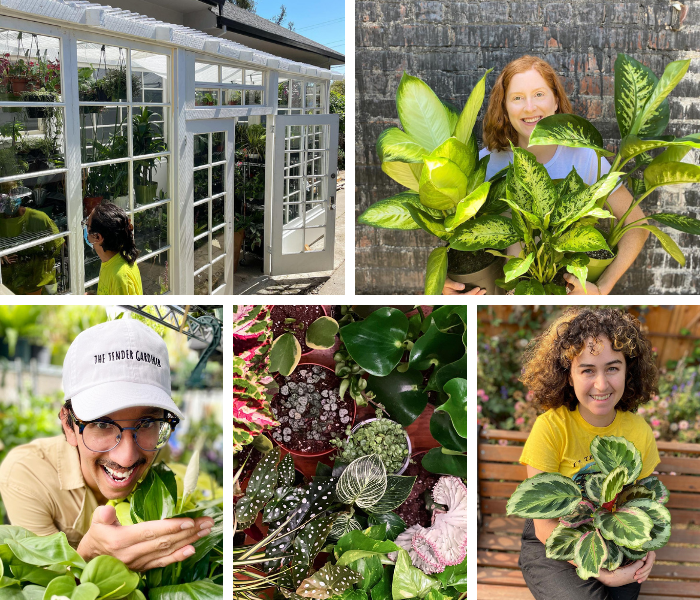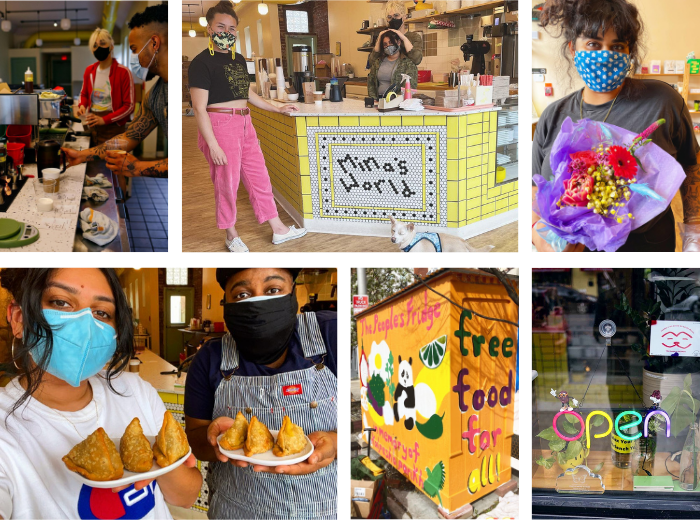Feature your business, services, products, events & news. Submit Website.
Breaking Top Featured Content:
Lessons for success from LGBTQ entrepreneurs


Local businesses have the power to make LGBTQ people feel safe and valued—from a small-town gay bar that raises funds for the community to the barber who affirms each client’s identity. “I look back to when I was younger and knowing that I had a bookstore in my neighborhood that was affirming and inclusive, a coffee shop that I could go to and feel like I didn’t have to hide who I was or that I wouldn’t be discriminated against if I showed up there on a date,” said RaShawn Hawkins, deputy director for the Human Rights Campaign’s Workplace Equality Program.
Despite challenges from the pandemic, an estimated 1.4 million LGBTQ entrepreneurs are working to create these connections every day. Gay bars and cafes—often the most accessible safe space—double as centers for activism and celebration. Other business owners are breaking barriers in industries where LGBTQ people have been historically marginalized, such as auto repair or the barber shop.
For master barber Khane Kutzwell, creating a space where her friends would feel welcome and comfortable was the whole reason she pursued the profession—and it’s why she’s mentoring the next generation of barbers today. To dive deeper, we heard from Kutzell and other LGBTQ business experts about how they’ve created inclusive environments, connected with their communities, and constructed dreams for the future.
Khane Kutzwell, owner of Camera Ready Kutz
In 2007, I had started hearing a lot of stories from my friends in the LGBTQIA+ community about their terrible treatment at neighborhood barber shops—some straight woman as well—just being refused service, with men thinking that a woman’s hair should always be long or people having to endure comments relating to their supposed sexuality. So my entrepreneurial mind went into action, and I went to barber school.
Let customers know they have a choice
Even though my barbers are independent contractors, I still have a set of rules and a culture here that I want followed, and if they don’t, then they just don’t rent the chair. We ask people their pronouns, which is something that’s pretty unique to the queer community.
When people sit in our chairs, the first thing we ask is, “What am I doing for you today?” That sets the tone right there that lets you know, I’m here for you. And we allow people to describe their haircuts. We guide the person throughout their whole cut from beginning to end and let them know, you have a choice.
Mentor the next generation
The barber shop is a service industry, and I don’t think a lot of barbers treat it that way. If you go to a coffee shop and you ask for a latte, they’re not going to look at you and give you a black coffee because they think that’s what you should drink. If you want an extra shot of espresso, they charge you, and they give you the extra shot of espresso. They don’t say, “Are you sure you need to be having that espresso?” They know that they will be scrutinized. They know that people will write reviews. They know that they’ll be held accountable. And for whatever reason, barber shops have skated under that radar since the inception of barbering. I also blame it on the barber schools, which is why my next venture is to open up a barber school because I believe they should be teaching these things as well.
“I’m here saying this needs to be different, and I’m going to do all that I can while I’m living to make sure it’s different.”
The atmosphere in barber shops has grown to be what it is for so long that people just expect it—that’s the way it is, without thinking, you know, what, this needs to be different. I’m here saying this needs to be different, and I’m going to do all that I can while I’m living to make sure it’s different.

Jove Meyer, owner of Jove Meyer Events
It was hard for me to be myself [at work], but ultimately once I finally did it, I realized I don’t have to change—the world has to change. There’s nothing wrong with who I am and who I love. What’s wrong is the way they think about who I am and who I love. And once that switch happened, everything kind of shifted. I was on a mission, not only to sort of help all couples celebrate who they are in their own way, but also to help our industry become a more inclusive and welcoming industry.
Give people the tools for change
Little by little we’re making moves and we’re making strides, but we can definitely all be better. And I think it starts with education. I do believe our industry is not inherently homophobic. I just think that they’re set in the ways of what they’ve done for so long, and change is not easy. And so I give everyone the benefit of the doubt, but I will help you, and I will call you out, and I will give you the tools to really make the changes that I think are necessary so that our industry of love celebrates everyone. Because I do believe there’s no room for hate in the industry of love.
[For example,] the “bridal” industry has got to go. It’s the wedding industry for all couples, not just straight, white, cis-gendered couples. And I just started to see it everywhere. I was like, what’s going on? Everyone is saying bride in front of my two grooms. Why does this say bridal suite?
Remember there’s a market for you
I just think you have to remember, there’s a market for you. You are talented, and you are incredible as you are, and spending your life trying to be someone else is a life sadly lived—based on my experience. Being authentic is the greatest asset we have in life and in business. Rather than trying to fit in with “those at the top,” build your own team of people around you, and come up together.

Lana Williams, owner of The Tender Gardener
I always want people to feel like they can reach out to me to get plant advice. And whenever someone picks up a plant, or if I’m talking to someone through DMs online, I always tell them, “Please reach out if your plant takes a turn.” I always want people to feel that we could have communication and that [owning a plant] is something that doesn’t have to be so scary and mysterious.
Get comfortable sharing your story
What was hard for me was just putting myself out there [on social media] because that wasn’t something I was super comfortable with. But I think the more that you can put yourself out there and tell your story and communicate with people, the more people can connect to you.
What I love about plants and wanted to share with people became even more important during the pandemic. Plants are living things that rely on you, especially when they’re in pots and inside your house. They ask us to slow down and focus on them. Plants have always been super helpful for me to cope with stress or anxiety, and I felt like so many people were also experiencing the joy and benefits of plants. It is such a mutually beneficial relationship.
Strike up organic connections
I love posting on my social media about other businesses, especially other queer businesses in the Bay Area that are my favorite spots to go to. I think it’s important as a business owner to create community and share community with other people and other businesses and support each other.
I’ve definitely had some wonderful businesses that are staples in Oakland, like The Cook and Her Farmer, who have been so encouraging to me. When I opened the business, I actually delivered flowers to them for Mother’s Day last year. Since then, we started developing a relationship and communicating, and they’ve invited me to do a couple of plant pop-ups outside of their restaurant. And it’s been just really wonderful to have that kind of encouragement and support from such an established business.

Sonam Parikh and Kate Egghart, co-owners of Mina’s World
Food is a unifier. By looking the way that [our cafe] does, we hope to go back to the original point of cafes: community organizational and meeting spaces. We aim to provide warmth and familiarity and a place where coming in doesn’t feel so intimidating.
Learn to ask for help
Something I’ve learned and had a hard time dealing with is accepting help from people when it’s offered—and to ask for it. There is a lot to be said about struggling and working really hard, but this cafe that does what it does for people couldn’t exist without us asking for help from the closest people to us: our own families.
A lot of it came from my mom pushing because we really wanted to do this, and this was an opportunity for her to help us. What makes me feel better is knowing that we are taking that privilege and using it to help people in our community and provide jobs for people—being able to create more with something like that.
Throw out the rule book
Nothing you see at Mina’s World was ever part of the plan. We really intended this space to be different, but one of the nicest blessings in the world is that we got to roll with the punches.
Our zero waste initiative, our goal of paying employees a living wage and stabilizing everybody’s income—none of this was necessarily written in stone before we opened, but through working really hard and needing to funnel our intense energy, these community programs were born. If we were going to be the cafe we intended to start out as, we probably wouldn’t be talking to you today.
The cafe became more and more of who we are as people and representatives of the people who work here. Seeing how deeply and quickly we had to pivot underlines for us, there really are no rules, and you can do whatever we want. We did that, and it worked for us.

The post Lessons for success from LGBTQ entrepreneurs appeared first on Yelp.
